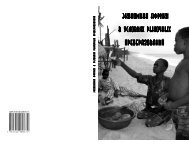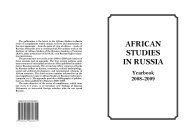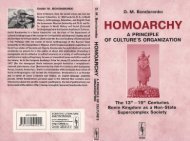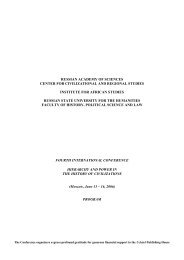L. Fituni, I. Abramova Resource Potential of Africa and Russia's ...
L. Fituni, I. Abramova Resource Potential of Africa and Russia's ...
L. Fituni, I. Abramova Resource Potential of Africa and Russia's ...
Create successful ePaper yourself
Turn your PDF publications into a flip-book with our unique Google optimized e-Paper software.
Exports <strong>of</strong> Russian raw materials to Algeria began to shrink after<br />
the 2006 agreement <strong>of</strong> the Association <strong>of</strong> Algeria with EU had<br />
come into effect. In accordance with the Agreement the parties assumed<br />
the obligation <strong>of</strong> launching a Free Trade Zone by 2012. Due<br />
to this obligation already in 2006 Algeria removed or reduced custom<br />
duties for over 2,000 commodity items originating from the EU.<br />
Many <strong>of</strong> these goods had been previously imported from Russia,<br />
<strong>and</strong> formed about 50% <strong>of</strong> Russian exports to Algeria. In September<br />
2007, in accordance with the relevant program <strong>of</strong> transition to the<br />
Free Trade Zone the import duties for 1095 items were reduced by<br />
20% <strong>and</strong> for 1858 by 5%. Such reductions will take place on the<br />
regular basis till the complete abolition <strong>of</strong> the customs duties in<br />
2012. 13<br />
Though formally a measure to open markets, these reductions<br />
negatively affect Russia’s trade with Algeria, making Russia’s<br />
goods (even those <strong>of</strong> superior quality) less competitive than those<br />
from the EU). This non-market price competition directly affects<br />
economic security <strong>of</strong> the Russian Federation by not only undercutting<br />
possibilities for Russian manufacturing industry to earn foreign<br />
currency, but also potentially forcing Russian companies to restrain<br />
production <strong>and</strong> dismiss redundant workforce. An obvious measure<br />
would be to look for ways <strong>of</strong> counterbalancing the economic security<br />
threats posed by Brussels’ expansionist maneuvering <strong>and</strong> to<br />
work out a coherent road map in order to protect the renascent Russian<br />
industries from non-market competition.<br />
One has to acknowledge that on the whole the EU managed to<br />
neutralize through various means Moscow’s attempts to translate<br />
into life Algeria’s <strong>and</strong> Russia’s good-will <strong>and</strong> intention to develop<br />
mutual economic relations. Intensive ‘personal work’ with a number<br />
<strong>of</strong> representatives <strong>of</strong> the Algerian elite <strong>and</strong> business circles restrained<br />
the efforts <strong>of</strong> the two countries to coordinate their energy<br />
policies on the global arena. The results <strong>of</strong> cooperation in the oil <strong>and</strong><br />
gas sector proved to be more modest than practically with any other<br />
energy exporter in Northern <strong>Africa</strong>. The EU in general <strong>and</strong> some EU<br />
members in particular still regard Algeria <strong>and</strong> other Afro-<br />
Mediterranean states if not as their backyard, then at least their zone<br />
157







